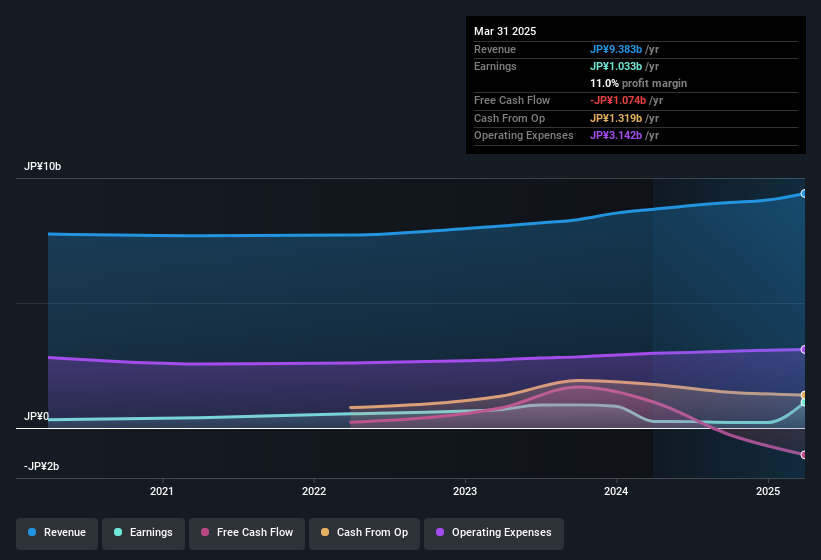- Japan
- /
- Commercial Services
- /
- TSE:9221
There May Be Underlying Issues With The Quality Of Fuluhashi EPO's (TSE:9221) Earnings

Unsurprisingly, Fuluhashi EPO Corporation's (TSE:9221) stock price was strong on the back of its healthy earnings report. We did some analysis and think that investors are missing some details hidden beneath the profit numbers.

Examining Cashflow Against Fuluhashi EPO's Earnings
As finance nerds would already know, the accrual ratio from cashflow is a key measure for assessing how well a company's free cash flow (FCF) matches its profit. The accrual ratio subtracts the FCF from the profit for a given period, and divides the result by the average operating assets of the company over that time. The ratio shows us how much a company's profit exceeds its FCF.
As a result, a negative accrual ratio is a positive for the company, and a positive accrual ratio is a negative. That is not intended to imply we should worry about a positive accrual ratio, but it's worth noting where the accrual ratio is rather high. To quote a 2014 paper by Lewellen and Resutek, "firms with higher accruals tend to be less profitable in the future".
Over the twelve months to March 2025, Fuluhashi EPO recorded an accrual ratio of 0.32. Therefore, we know that it's free cashflow was significantly lower than its statutory profit, raising questions about how useful that profit figure really is. Over the last year it actually had negative free cash flow of JP¥1.1b, in contrast to the aforementioned profit of JP¥1.03b. It's worth noting that Fuluhashi EPO generated positive FCF of JP¥1.0b a year ago, so at least they've done it in the past. The good news for shareholders is that Fuluhashi EPO's accrual ratio was much better last year, so this year's poor reading might simply be a case of a short term mismatch between profit and FCF. As a result, some shareholders may be looking for stronger cash conversion in the current year.
Note: we always recommend investors check balance sheet strength. Click here to be taken to our balance sheet analysis of Fuluhashi EPO.
Our Take On Fuluhashi EPO's Profit Performance
As we have made quite clear, we're a bit worried that Fuluhashi EPO didn't back up the last year's profit with free cashflow. For this reason, we think that Fuluhashi EPO's statutory profits may be a bad guide to its underlying earnings power, and might give investors an overly positive impression of the company. The silver lining is that its EPS growth over the last year has been really wonderful, even if it's not a perfect measure. Of course, we've only just scratched the surface when it comes to analysing its earnings; one could also consider margins, forecast growth, and return on investment, among other factors. Keep in mind, when it comes to analysing a stock it's worth noting the risks involved. Every company has risks, and we've spotted 3 warning signs for Fuluhashi EPO (of which 2 are a bit concerning!) you should know about.
Today we've zoomed in on a single data point to better understand the nature of Fuluhashi EPO's profit. But there is always more to discover if you are capable of focussing your mind on minutiae. Some people consider a high return on equity to be a good sign of a quality business. So you may wish to see this free collection of companies boasting high return on equity, or this list of stocks with high insider ownership.
New: AI Stock Screener & Alerts
Our new AI Stock Screener scans the market every day to uncover opportunities.
• Dividend Powerhouses (3%+ Yield)
• Undervalued Small Caps with Insider Buying
• High growth Tech and AI Companies
Or build your own from over 50 metrics.
Have feedback on this article? Concerned about the content? Get in touch with us directly. Alternatively, email editorial-team (at) simplywallst.com.
This article by Simply Wall St is general in nature. We provide commentary based on historical data and analyst forecasts only using an unbiased methodology and our articles are not intended to be financial advice. It does not constitute a recommendation to buy or sell any stock, and does not take account of your objectives, or your financial situation. We aim to bring you long-term focused analysis driven by fundamental data. Note that our analysis may not factor in the latest price-sensitive company announcements or qualitative material. Simply Wall St has no position in any stocks mentioned.
About TSE:9221
Fuluhashi EPO
Engages in the processing and recycling of wood waste in Japan.
Proven track record with adequate balance sheet.
Market Insights
Community Narratives




